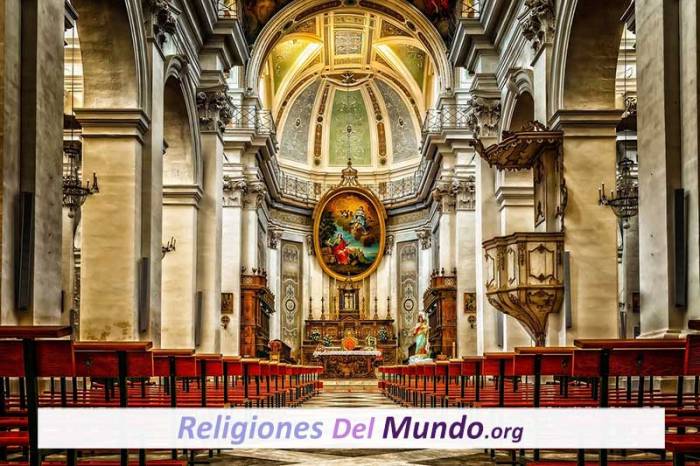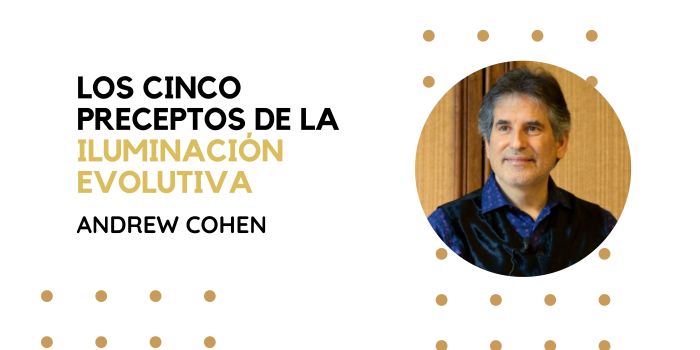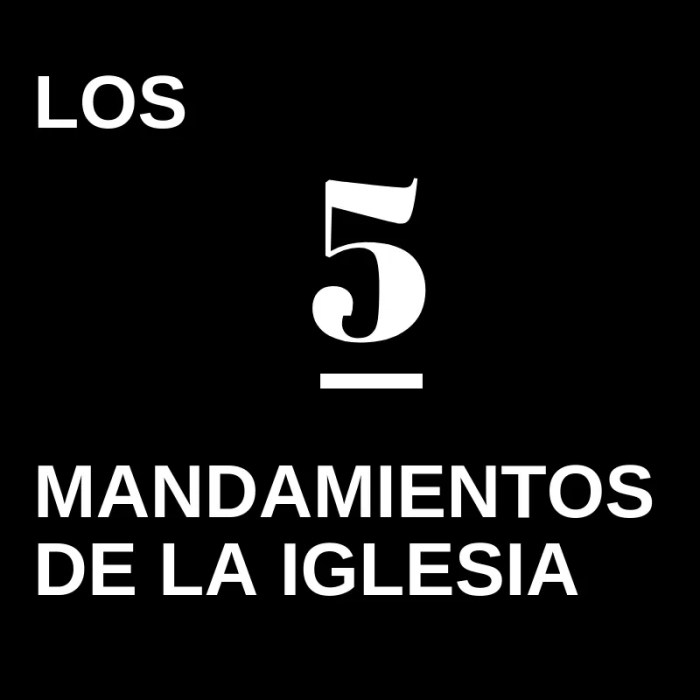The Cinco Preceptos de la Iglesia, or Five Precepts of the Church, are fundamental pillars of Catholic faith, guiding the spiritual lives of believers. These precepts, rooted in tradition and divine law, provide a framework for living a virtuous and fulfilling Christian life.
From attending Mass to receiving Communion, these precepts encompass essential practices that deepen our connection with God and foster our spiritual growth.
Introduction

The Cinco Preceptos de la Iglesia (Five Precepts of the Church) are a set of fundamental obligations for practicing Catholics, established by the Church authorities to guide the spiritual and moral lives of its members.
These precepts originated in the early centuries of Christianity, drawing inspiration from biblical teachings and the traditions of the Church Fathers. They have evolved over time to reflect the changing needs and circumstances of the Catholic community, but their essential purpose remains the same: to promote spiritual growth, maintain the unity of the Church, and provide a framework for ethical conduct.
Significance
The Cinco Preceptos de la Iglesia hold great significance in the Catholic faith. They serve as a practical guide for Catholics to live out their baptismal promises and strive for holiness. By observing these precepts, Catholics demonstrate their commitment to God and the Church, and they contribute to the overall well-being of the Christian community.
The precepts provide a framework for Catholics to discern right from wrong, to avoid sin, and to grow in virtue. They encourage Catholics to participate actively in the sacraments, to pray regularly, and to live a life of service to others.
By following these precepts, Catholics can deepen their relationship with God, strengthen their faith, and make a positive impact on the world.
Historical Context
The Cinco Preceptos de la Iglesia have their roots in the early Church. The Didache, an early Christian document dating back to the first or second century, contains a list of ethical teachings that resemble the precepts. Over time, these teachings were refined and formalized by the Church Fathers, such as Tertullian and Augustine, who emphasized the importance of obedience to the Church’s authority.
In the Middle Ages, the precepts were incorporated into canon law and became a cornerstone of Catholic moral teaching. The Council of Trent (1545-1563) reaffirmed the importance of the precepts and clarified their content. The precepts have continued to be taught and observed by Catholics throughout history, and they remain an essential part of Catholic doctrine today.
First Precept: Cinco Preceptos De La Iglesia
The First Precept of the Church mandates the faithful to attend Mass on Sundays and other holy days of obligation. This precept is rooted in the commandment to honor the Lord’s Day, as established by God’s covenant with the Israelites and reaffirmed by Jesus Christ in the New Testament.
Obligation to Attend Mass
The obligation to attend Mass on Sundays and holy days of obligation is binding on all Catholics who have reached the age of reason (typically around seven years old). Those who are physically or morally unable to attend Mass are exempt from this obligation.
For example, individuals who are sick, elderly, or homebound may be excused from attending Mass.
Importance of Receiving the Eucharist
Attending Mass is not merely an obligation but an opportunity to participate in the liturgical celebration and receive the Eucharist. The Eucharist is the sacrament in which Catholics believe they receive the Body and Blood of Jesus Christ. Receiving the Eucharist is a central part of Catholic faith and practice, and it is through this sacrament that Catholics are strengthened and united with Christ and the Church.
Second Precept: Confession

The Second Precept of the Church calls us to confess our sins to a priest at least once a year. This Sacrament of Confession is an opportunity for us to reconcile with God and receive His forgiveness. Through Confession, we acknowledge our sins, repent of them, and receive absolution from the priest.
Regular Confession is essential for spiritual growth. It helps us to identify our sins, turn away from them, and grow in holiness. By confessing our sins, we open ourselves up to God’s grace and allow Him to work in our lives.
Benefits of Regular Confession
- Reconciliation with God
- Forgiveness of sins
- Spiritual growth
- Peace of mind
- Guidance and support from a priest
Third Precept: Reception of Holy Communion

The Third Precept of the Church requires us to receive Holy Communion at least once a year, during the Easter season. Holy Communion is the reception of the Body and Blood of Christ under the appearance of bread and wine.
It is the source and summit of our Catholic faith, and it is through Holy Communion that we receive the graces we need to live a Christian life.
Conditions for Receiving Holy Communion Worthily, Cinco preceptos de la iglesia
In order to receive Holy Communion worthily, we must be in a state of grace. This means that we must have confessed our sins and received absolution. We must also be fasting from food and drink for at least one hour before receiving Communion.
Additionally, we must be properly disposed, meaning that we are free from any mortal sin and have the right intention of receiving Communion.
Spiritual Significance and Benefits of Receiving the Eucharist
Receiving Holy Communion is a profound spiritual experience. It is a time when we encounter Christ in a real and personal way. Through Holy Communion, we receive the graces we need to live a Christian life. These graces include:
- Forgiveness of sins
- Increase in faith, hope, and love
- Strengthening of our union with Christ
- Preparation for eternal life
Fourth Precept: Fasting and Abstinence

Fasting and abstinence are practices with deep roots in Christian tradition, observed for centuries as a means of spiritual discipline and preparation for religious celebrations. Historically, fasting involved refraining from food for a period of time, while abstinence meant abstaining from specific types of food, such as meat.
Today, the Catholic Church’s Fourth Precept requires Catholics to fast and abstain on certain designated days. Fasting is observed on Ash Wednesday and Good Friday, while abstinence from meat is required on all Fridays of the year, except for those that fall on a solemnity.
The five precepts of the church are important for Catholics to follow. To learn more about how these precepts affect Ben & Jerry’s, check out this SWOT analysis . The analysis provides insights into the company’s strengths, weaknesses, opportunities, and threats.
Understanding these factors can help Catholics make informed decisions about their support for Ben & Jerry’s.
Exemptions
There are certain exemptions to the fasting and abstinence obligations. Children under the age of 14, the elderly, and those with health conditions that prevent them from fasting or abstaining are not required to do so. Pregnant and nursing women may also be exempt from fasting.
Fifth Precept: Almsgiving

The Fifth Precept of the Church calls upon Christians to fulfill their duty to assist those in need. This obligation is rooted in the teachings of Jesus Christ, who emphasized the importance of charity and compassion. Almsgiving, or giving to the poor, is a fundamental expression of Christian love and a means of sharing our blessings with others.
Forms of Almsgiving
Almsgiving can take various forms, including:
- Material assistance:Providing food, clothing, shelter, or financial aid to those in need.
- Spiritual support:Offering prayers, counseling, or encouragement to those who are struggling.
- Time and effort:Volunteering our time to help organizations that serve the poor or engaging in acts of service within our communities.
Spiritual Implications
Almsgiving is not merely a charitable act but also a means of spiritual growth. By giving to others, we open ourselves to God’s grace and experience the joy of sharing our blessings. Almsgiving can help us:
- Develop compassion and empathy:By witnessing the needs of others, we cultivate a greater understanding of their struggles and develop a desire to help.
- Practice humility:Recognizing that we have been blessed in many ways can lead us to a deeper sense of gratitude and humility.
- Grow in faith:Almsgiving can strengthen our faith in God’s providence and remind us that we are called to be instruments of his love in the world.
Popular Questions
What is the significance of the Cinco Preceptos de la Iglesia?
The Cinco Preceptos de la Iglesia are essential practices that provide a foundation for living a virtuous and fulfilling Catholic life, guiding believers in their spiritual journey.
Why is attending Mass on Sundays and holy days of obligation important?
Attending Mass is a central obligation for Catholics, as it allows them to participate in the liturgical celebration, receive the Eucharist, and strengthen their connection with God and the community.
What are the benefits of receiving Holy Communion regularly?
Receiving Holy Communion worthily nourishes the soul, deepens our union with Christ, and strengthens our spiritual growth.
How does almsgiving contribute to our spiritual well-being?
Almsgiving is a Christian duty that allows us to express our love for God and neighbor, foster compassion, and participate in building a more just and equitable society.